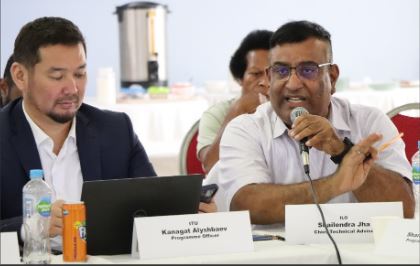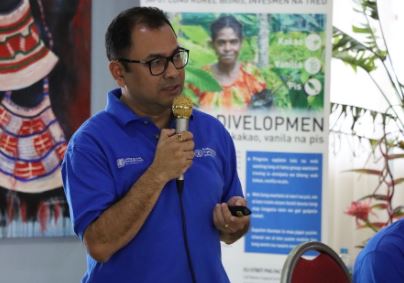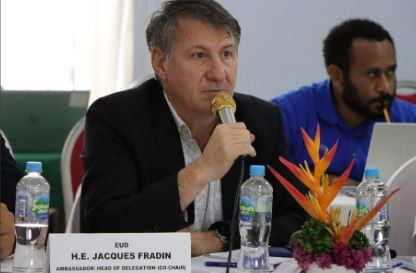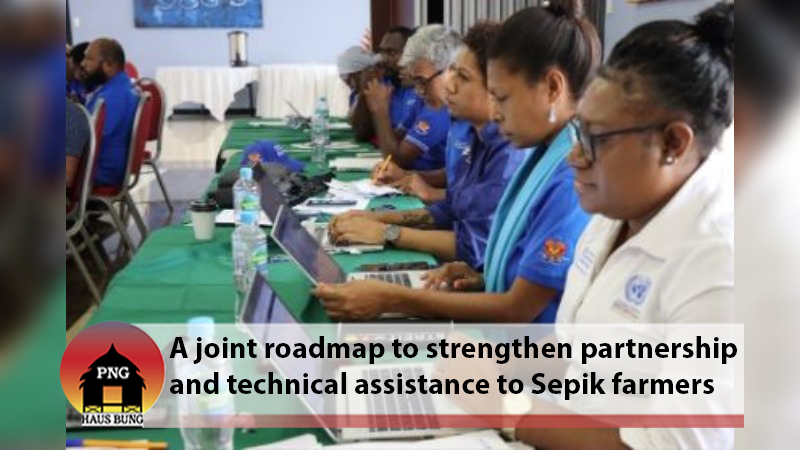Reaching the milestone of providing support to over 15,000 cocoa, vanilla and fisheries-dependant households in the Sepik region in the first nine months of 2022, was the highlight of the Programme Steering Committee’s (PSC) meeting held in Wewak, East Sepik Province.
The PSC meeting, attended by high officials from the PNG Department of National Planning and Monitoring (DNPM), Department of Agriculture, Department of ICT, Provincial Administrations of East and West Sepiks, the European Union, and representatives from five involved UN agencies, also highlights the need to further strengthen the partnership between implementing partners, counterparts, and stakeholders at national, provincial, and local levels.
The high level Programme Steering Committee convenes every six months to review progress and accomplishments and take decisions on the next steps and work plans.
Wesley Wellie, the head of DNPM’s National Authorising Officer-Support Unit, in his remarks during the meeting, highlighted the EU-STREIT PNG Programme as “an important investment made by the EU in partnership with the Government of PNG, FAO, ILO, ITU, UNCDF, and UNDP.” He added:

“This meeting is convened to review where we currently stand and where the Programme is heading.”
Explaining the importance of the Programme, the DNPM Official mentioned that “there are high expectations in the Programme in terms of target outcomes and also sustainability of the results, and we need to focus on strengthening partnership, coordination, and cooperation between all stakeholders.”
Wellie concluded his remarks by acknowledging “the support and cooperation from the European Union and the UN implementing partners, which involves extensive dialogue and consultations towards joint decision-making.
The EU Ambassador to PNG, His Excellency Jacques Fradin, in his address at the PSC Meeting, also underlined the fact that “the EU-STREIT PNG Programme is an initiative that aims to empower the people of East and West Sepiks to help improve their cocoa, vanilla and fisheries value chains.” Mentioning the way forward to tackle the existing challenges in the Programme’s implementation, the EU Ambassador highlight “the need to move collectively to solve issues.”

The UN Resident Coordinator a.i. in PNG, Marielle Sander, in her speech stated that “the EU-STREIT PNG Programme, as a UN joint project, benefits from the convergence of expertise from the five UN agencies involved in its implementation and also benefits from the experiences and capacity of the PNG partners at the national, provincial and local level government.”
She further stressed that “the project is a great opportunity to work together for the benefit of the people of the Sepik and Papua New Guinea.” Mentioning the PSC Meeting, Sander added, “this meeting is to review the project progress and achievements and also to set an agenda and work plan to speed up the delivery.”
The FAO Regional Programme Leader, Takayuki Hagiwara, in his address at the PSC Meeting, reassured the participants that FAO, as the lead agency in implementing the EU-STREIT PNG Programme, “has a strong commitment to keep the EU-STREIT PNG Programme on the right track and to speed up delivery in a joint work plan.”
Addressing the PSC Meeting, Xuebing Sun, the EU-STREIT PNG Programme Coordinator, emphasised that “the Programme made good progress in 2022 compared to the progress made in 2021.”
Adding, “Thanks to strategic guidance and technical support received from all partners and stakeholders, the Programme was able to overcome some remaining bottlenecks and constraints that slowed down the Programme’s implementation progress in the last year.”

Sun further emphasised that “the Programme is currently in good shape in terms of picking up progress and delivering the anticipated impacts and desired results.”
Rabi G. Rasaily, the FAO Senior Agricultural Officer and Programme Coordinator a.i. in his concluding remarks acknowledged the valuable feedback received from the Co-Chairs and the PSC members for further enhancement in the Programe tailord support to promote and develop inclusive agri-food value chains and agri-enterprises in the Sepik.
Rasaily called on all partners, stakeholders and interested partners to join the hands and seize the opportunity to work together to uplift the living conditions of the people through triggering transformative change and sustainable progress in agri-food sector.
The EU-STREIT PNG Programme, since January 2022, has reached out and provided technical assistance and support to 15,069 households (90,414 individual beneficiaries) in East and West Sepik provinces. These supports include:
- Built the capacity of 9,500 cocoa, vanilla, and fisheries farmers.
- Organised one exposure visit to an international trade show for PNG agribusinesses.
- Launched an Innovation Fund and received 65 proposals.
- Developed legislation on Geographical Indication and drafted a manual for the Certificate Authority.
- Started distribution of 1,400,000 Cocoa Pod Borer (CPB) tolerant seedlings.
- Capacitated 157 nurseries.
- Distributed 785 cocoa nursery shed clothing.
- Distributed 2,000,000 polybags.
- Rolled out support scheme for 900 fermentaries.
- Trained 400 fermentary owners on cocoa quality assessment.
- Established a partnership with the New Guinea Binatang Research Centre.
- Established 13 vanilla vines treatment sheds.
- Ensured the availability of 130,000 high-quality vanilla vines.
- Provided 273 sets of vanilla planting and harvesting tools.
- Established 72 vanilla farming groups.
- Procured 40 outboard motor engines with the boats for distribution among target groups.
- Supported 150 fisheries groups.
- Launched an Agri-MSME Challenge Fund.
- Established 100 financial services access points.
- Opened 60,000 financial services accounts.
- Developed two e-agriculture strategies.
- Rehabilitated 83.7 km of rural roads.
- Selected 6 public facilities for the installation of Solar Powered Renewable Energy
The EU-STREIT PNG Programme, being implemented as a UN Joint Programme (FAO as the leading agency, and ILO, ITU, UNCDF and UNDP as partners), is the largest grant-funded Programme of the European Union in the country and the Pacific region.

The Programme aims to help improve the lives of the people from East and West Sepik provinces, by focusing on increasing sustainable and inclusive economic development of rural areas through improved economic returns and opportunities from cocoa, vanilla and fishery value chains while strengthening and improving the efficiency of value chain enablers, including the business environment and supporting sustainable, climate-proof transport and energy infrastructure development.

